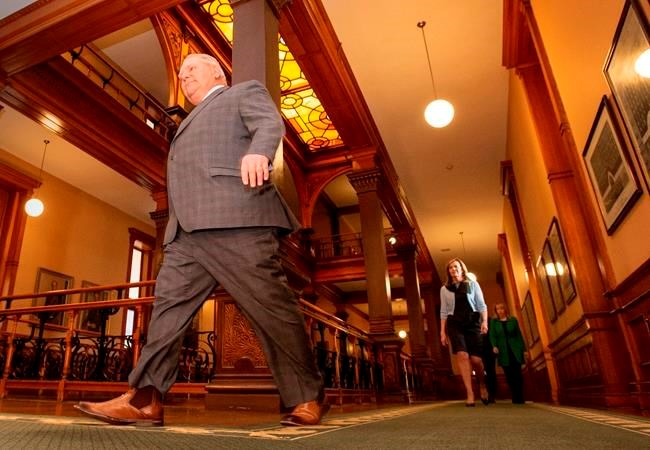TORONTO — Long-term care in Ontario "needs to be changed," an emotional Doug Ford said Thursday, moments before his office confirmed the premier's mother-in-law, who lives in a seniors home, had tested positive for COVID-19.
Ford, whose 95-year-old mother-in-law lives in a Toronto home with an outbreak of the virus, choked back tears during his daily briefing as he discussed families of long-term care residents trying to communicate with their loved ones.
The premier announced a number of new measures to fight COVID-19 in group homes and shelters, but continued to face tough questions about the province's response as deaths mount in long-term care facilities.
"The system — we can do better," Ford said, pausing for a moment. "The system needs to be changed and we're changing the system. But right now, our main focus is that we protect the people inside these long-term care homes."
Ford also thanked the federal government for granting the province's request for Canadian Forces members to provide operational and logistical aid in the fight against the virus in long-term care homes.
"They're going to be there to support the front-line health-care workers in any capacity that they can," he said. "We need people."
According to data from the Ministry of Health and Long-Term Care, there were 68 additional deaths in long-term care homes across the province over the past 24 hours.
There have been at least 516 deaths in those facilities — including one personal support worker — amid outbreaks at 132 of them, according to ministry data.
Long-term Care Minister Merrilee Fullerton said her department had already begun looking at a number of systemic issues affecting the sector, including staffing shortages, before the pandemic.
She defended the actions taken by the province to address COVID-19's spread in long-term care homes.
"We have used every tool that we had and we've created new tools," she said, referring to the military support. "We're not afraid to ask for help."
Ontario's chief medical officer of health said all of the province's health systems, including its long-term care homes, have been tested by the COVID-19 pandemic.
"Right this moment (we) are in the midst of dealing with the outbreak and trying to curtail it," Dr. David Williams said. "This is the first time any sector has dealt with a pandemic and so it's no small matter."
The home where Ford's mother-in-law lives said in a statement Thursday afternoon that it could not release information about specific patients because of confidentiality rules.
But West Park Heath Care Centre confirmed that 49 of its residents and 30 staff have tested positive for the virus. Thirteen residents have died.
A number of homes have been particularly hard hit, including Eatonville Care Centre in Toronto with 37 deaths, Orchard Villa Long-Term Care Home in Pickering with 32 deaths and Altamont Care Community in Toronto with 24 deaths. A personal support worker who worked at that facility also died.
Pinecrest Nursing Home in Bobcaygeon has had 29 deaths, though none have happened in the past two weeks. Several other homes have also had more than 20 deaths.
Social Services Minister Todd Smith said over the next 48 hours, new screening measures and staffing resources will be provided to group homes and shelters across Ontario to help fight the virus in those settings.
Ontario reported 634 new cases of COVID-19 and 54 more deaths on Thursday.
The latest data reported by public health officials Thursday represents the largest single day increase in cases, bringing the total number in the province to 12,879 — a 5.2 per cent increase over Wednesday.
The total includes 713 deaths and 6,680 cases that have been resolved.
The provincewide data is taken from a different system than the ministry figures, and the two are often out of sync.
Meanwhile, Ford extended a series of emergency orders issued last month until May 6 and urged people to continue to stay home.
The pandemic emergency orders, which had been set to expire Thursday, will also now grant mental health and addictions agencies the ability to redeploy staff during the pandemic. Similar measures have been introduced for the health-care and long-term care sectors.
The extension will also see continued restrictions that limit long-term care or retirement home staff to working in only one facility.
The government had been criticized for the short duration of that order when it was issued last week.
Last week, Ford opened the door to a systemic review of the long-term care system, saying there were "cracks" in the way it operated and calling the pandemic a "wake-up call".
This report by The Canadian Press was first published April 23, 2020.
Shawn Jeffords, The Canadian Press
Note to readers: This is a corrected story. A previous version had an incorrect number of new deaths in long-term care homes in Ontario.

